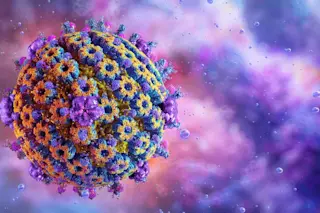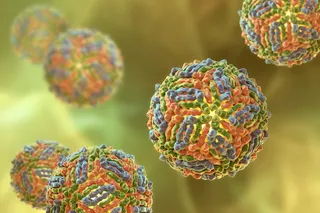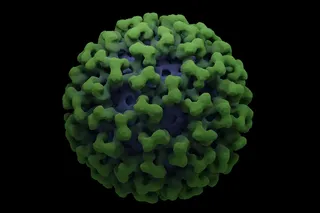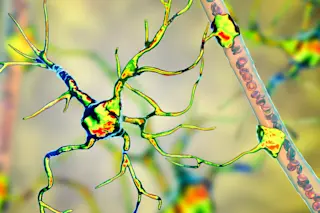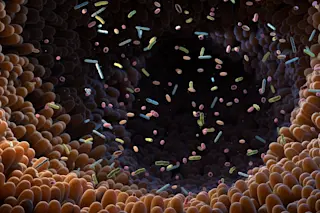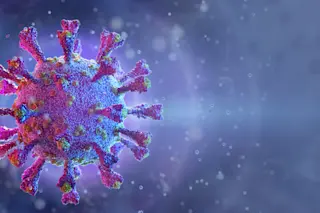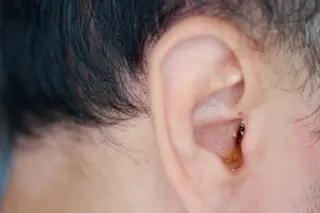If you’ve ever had a cold sore, the viral infection that caused it may lead to a higher risk of developing Alzheimer's disease down the line. A growing body of evidence suggests that herpes simplex virus-1 (HSV-1) — a common virus that often results in cold sores — is linked to Alzheimer’s.
Several studies have found a correlation between HSV-1 infection and tau proteins, which play a major role in Alzheimer's progression. Find out what can happen inside your aging brain after catching this viral infection, and what scientists are saying about possible therapeutic treatments.
Alzheimer’s: A Growing Problem
Alzheimer’s disease, a form of dementia associated with severe memory loss and other cognitive impairments, will become even more prevalent over the next few decades. In the U.S. alone, the number of people suffering from the condition will nearly double by 2050, with cases expected to jump from 7 million to 13 million.
Given the impending swell in Alzheimer’s diagnoses, scientists have resolved to gain a better understanding of the emergence and evolution of the disease.
Scientists have closely followed the influence of herpes viruses for answers. The most common variations of the herpes virus are HSV-1 (causing oral herpes) and HSV-2 (causing genital herpes, usually transmitted through sexual contact). Most people will contract HSV-1 at some point during their lives — data has shown that HSV-1 affects 57 to 80 percent of adults in the U.S. And although it’s typically harmless, remnants of the infection linger in the body for life and can sometimes resurface.
The lasting presence of HSV-1 in the body could be a major factor in Alzheimer's development. A January 2025 study published in the journal Cell Reports seemingly confirmed this idea, finding proteins related to HSV-1 in Alzheimer’s brain samples. The researchers determined that the viral proteins increase as the disease worsens.
Read More: Ancient Herpes Viruses Might Have Spread Through Kissing
The Link Between Tau and HSV-1
The researchers of this study also uncovered an interesting relationship between HSV-1 infection and tau proteins.
Tau proteins, although associated with Alzheimer’s, aren’t destructive right from the outset. They help stabilize an integral portion of neurons called the axon. However, they can undergo hyperphosphorylation, in which their phosphate count grows significantly. This strips the proteins of their original, beneficial function and causes them to aggregate into neurofibrillary tangles (NFTs), contributing to neurodegeneration seen in Alzheimer's.
According to researchers of the 2025 study, HSV-1 infection can modulate levels of tau protein in the brain and regulate their function. They say the brain’s immune response promotes modified tau proteins that reduce the amount of postinfection neuron death. This indicates that tau initially protects the brain against infection. However, this process ultimately induces brain deterioration in the long term through heightened tau aggregation.
The study states that repeated HSV-1 reactivation can trigger chronic tau hyperphosphorylation, leading to tau toxicity and, thus, neurodegeneration.
Turning Tau into Alzheimer’s Treatment
The researchers believe this link between HSV-1 and tau could actually inspire new treatment methods for Alzheimer's. They will continue working to find a way to replicate the protective power of tau phosphorylation without triggering the aggregation responsible for Alzheimer’s.
The role of viral infections in Alzheimer's has yet to be fully understood. One factor that requires further research is how viruses might affect another culprit of Alzheimer’s, the accumulation of amyloid-beta proteins that form plaque in grey matter (a tissue making up the brain’s outer layer).
Scientists have their eyes on viruses other than HSV-1 as well, such as varicella-zoster virus (which causes chickenpox and shingles). Some studies suggest that this virus may raise dementia risk, and others suggest that shingles vaccination may lower dementia risk.
Alzheimer's currently has no cure, but scientists are focused on finding improved therapies for the disease. The most vital answers may still lie in HSV-1 infection and other viruses that are an inevitable aspect of many people's lives.
This article is not offering medical advice and should be used for informational purposes only.
Read More: Rosemary and Sage Could Lead to Better Alzheimer’s Treatment
Article Sources
Our writers at Discovermagazine.com use peer-reviewed studies and high-quality sources for our articles, and our editors review for scientific accuracy and editorial standards. Review the sources used below for this article:
PubMed. A Comprehensive Overview of Epidemiology, Pathogenesis and the Management of Herpes Labialis
Cell. Anti-herpetic tau preserves neurons via the cGAS-STING-TBK1 pathway in Alzheimer’s disease
Michigan State University. Tau: A good protein gone bad
Harvard Health Publishing. Are some cases of Alzheimer's disease caused by infection?
Stanford Medicine. Study strengthens link between shingles vaccine and lower dementia risk



